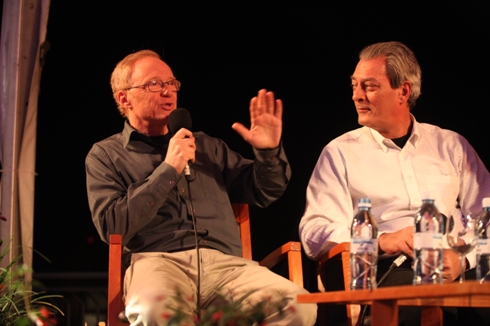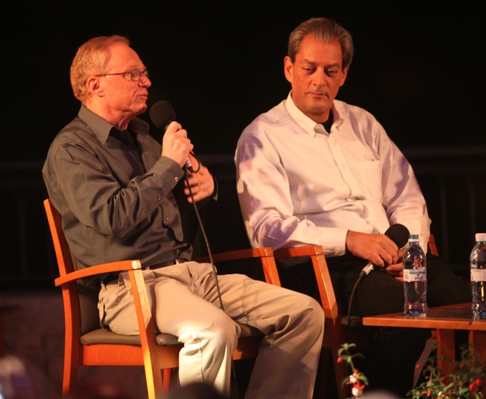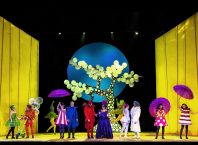
Famous writers are inevitably surrounded by an aura of myth. When David Grossman and Paul Auster got together at Mishkenot Sha’ananim last Tuesday, it was not only the night air of Jerusalem that sent shivers of anticipation through the crowd. Such an encounter with a beloved author can often be disappointing, and moderator Kobi Meidan opened the discussion in a pre-emptive move, asking the writers “Do you feel that your books are better versions of yourself?”
“Absolutely,” responded Auster, “the best of me is in my books. Writers are just people, after all. We have flaws just like everybody else.” Yet both Auster and Grossman’s lively, articulate and insightful responses throughout the evening would appear to contradict that statement, leaving the mythic stature of these literary heroes intact. They did much however, to dispel the myth of the solitary writer, writing through despair.
Auster said, “I’m happiest when I’m doing it [writing]. I feel more energized, I feel more connected to the world.” Grossman was in complete agreement: “When I write I am much more attuned to everything, much more alive, sharp. I even feel better physically. I’m more vivid, vital. Everything means something to me. When I stop writing, when the process ends, I sometimes wonder – what are all those people doing when they are not writing?”
“Reading!” called out a voice from the audience, and that is perhaps the key to understanding the attraction of such encounters with authors. When a reader becomes deeply involved with a book, she or he engages in dialogue with the characters, and through them, in a certain sense, with the author. Many of the people who gathered in the events tent at Mishkenot Sha’ananim last Tuesday have been talking to Auster and Grossman for a long time through the characters these writers have created. The pleasure in hearing them speak is very close to the pleasure of reading, yet more spontaneous and ephemeral, like the difference between seeing a play at the theatre and watching improvisation.
Readers often wonder about the author’s relationship to his characters, Grossman’s comments were very interesting in this context, as he said, “If a character is significant I hope it will be with me for the rest of my life. I have a very solid team within me.” When Meidan asked the authors about the experience of writing the character of a woman, Grossman responded: “We all consist of so many personalities, so many options…being a writer allows you to melt, and to diffuse into other options.” Of the protagonist of his latest novel, Ora, he said, “I loved being her.”
Auster, who has written many different voices and characters, compared writers to actors as “trying to embody another human being. It’s a mysterious process. I connect to the idea of play.” Taking the comparison to acting a bit further, Grossman added, “I always need to know the physicality, only then I can take off. Paul is right, we are also actors. We impersonate. It takes a lot of identification and empathy.” The similarity in the author’s perspectives on writing was such that at one point Grossman commented, “I think you need only one of us.”
Both viewed the writer’s path as one of mystery and uncertainty, each writing project a journey on which one sets out without maps, charts or set plans. Auster, who described himself as “unemployed” at the moment, said, “Each time you start a book it’s as if you’ve never written anything and you are a beginner again. Because you’ve never written this book before, you have to teach yourself how to write it as you write it.” Grossman, who is currently working on something new said, “I’m not sure whether it will be a novella, a play or even an opera.”

When the conversation took a turn to the wider political context, it was apparent Auster and Grossman maintain a critical stance in relation to the current political situation in their own countries and expressed their concerns for the future. Auster said, “One could argue that in the United States there is a kind of civil war that’s been going on, not fought with bullets, but with ideas I suppose, words. We’re a very divided country and it seems that the two sides are unable to talk to each other…of course, our problems are not as great as the ones you are going through here.”
Indeed, Grossman, in speaking of the situation in Israel, spoke of “the fragility and fear, this deep anxiety that most Israelis have. How we shrink, how we try to minimize our contact with reality. This is contradictory to our survival instincts. The instincts of survival tell us to be in much more full contact with reality in order to anticipate what happens and to act and to initiate all kinds of steps to save us. But no, we shrink, we freeze in front of that and we develop this, what I feel this culture of hatred within Israel. Just listen to the news…all the murderous events of the last 24 hours. The way we treat each other…the violence that we are immersed in for 100 years, eventually, it has infiltrated into our most internal organs. And we treat each other like that. And of course this hatred can be explained because each side regards the other as an existential danger, an existential risk…If we continue like that we are doomed.”
Recalling Israeli writer Nir Baram’s appeal to the visiting writers on the opening night of the festival, Meidan asked Auster “tell us what you see.” Auster replied, “I’ve only been here now for a few days but the mood has changed in the 13 years since I was last here…I can feel a much darker spirit over this place, much more despair, very little optimism about resolving the issues that need to be resolved and I was horrified to see the fences. It saddened me to a degree that’s almost incomprehensible.”
Yet it is in the relationship of the writer to society that the two writers (who have been friends since 1997) differed. When Meidan asked whether they “also wish to change society” Auster said, “When I was younger I believed, I thought poetry could change the world,” saying that he now sees the beauty of art in its “utter uselessness, it is just there.” Here Grossman’s path diverged from Auster, saying, “I don’t write for something, I write because of something. I am tuned to the physical situation, the accuracy of every moment. We also express our era in so many ways, relating to reality directly or ignoring it. Inevitably, we also write a political document.”
Perhaps the explanation for this difference between writers, so similar in so many other respects, lies in Grossman’s words:
I live here. It humiliates me as a human being to collaborate with apathy. I think this is the most significant place for a Jew to live, to explore this identity. There are so many things in Israel that are still miraculous to me when I look at them…in spite of all the difficulties and war and economic situation. And I feel we do not treat this privilege that we got from history with enough respect…and to see how we are totally helpless in front of the situation. How we see with open eyes where we are heading. And the place we are heading is not a good place for us. It will make life here unbearable for us and our neighbors. And yet we continue to go there.”
AYELET DEKEL






Comments are closed.